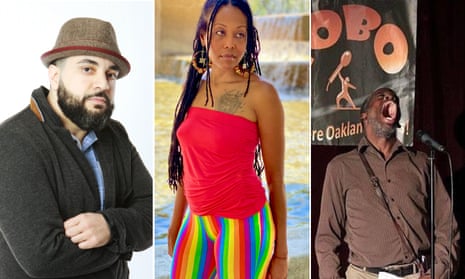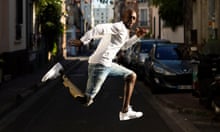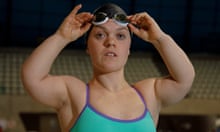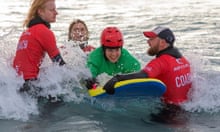‘Biggie made being a big guy cool,” says George Doman. “I want to make being disabled cool. I don’t see why we can’t. Honestly? On this new song, we sound like superheroes. It’s like we deserve our own Marvel movie.”
California resident Doman, 37, has been rapping under the name Georgetragic since the dawn of the century, and in 2007 had a track on an album released with the PlayStation game God of War II. But the new song he refers to represents his best chance yet of reaching a mass audience. He takes the first verse in a collaboration with two other disabled rappers on the title track for the documentary Rising Phoenix, a film by directors Ian Bonhôte and Peter Ettedgui, who made McQueen, the acclaimed 2018 biography of fashion designer Alexander McQueen.
Rising Phoenix tells the story of the Paralympics and some of the games’ competitors. The track of the same name was the idea of soundtrack composer and producer Daniel Pemberton, who chose to work exclusively with disabled musicians on the film’s score and provided the rappers with a huge soundscape, driven by a string-laden pulsebeat. Against images of the film’s Paralympic athletes rendered as classical marble sculptures – a direct visual nod to the end credits of Avengers: Age of Ultron – the superhero notion is writ large. But so is a simmering sense of anger from a community all too used to being ignored.
“I used to tell my friends my disability is my superpower,” says Doman, who has cerebral palsy. “What are the chances that now, during the coronavirus, we’re doing this song, in a movie about the Paralympics, and the film ultimately is about disabilities being a superpower, and I’m one of the spokespeople for the song? It’s just sad that it’s taken so long.”
The decision to make the theme song a rap track was influenced by Channel 4’s use of Public Enemy’s Harder Than You Think as the theme for the station’s coverage of the 2012 London Paralympics. Having decided to go down the rap route, Pemberton set out to find disabled emcees to collaborate with. He made contact with Leroy Moore, a rapper, poet, journalist and disability-rights activist who, in 2007, co-founded the collective Krip-Hop Nation in Oakland, California, and asked whether any of the organisation’s artists might be interested in taking part. The invitation was enthusiastically received.
“In the London Paralympics it was all about Public Enemy – it wasn’t really about people with disabilities,” says Moore. “A famous non-disabled person can do a track for a disabled event? It doesn’t make any sense. Daniel’s really ripping that notion up, and I give mad thanks to him, because usually we get passed by.”
Krip-Hop Nation is both a campaigning organisation and a platform for its musician members to collaborate and help each other reach wider audiences. But its members use the term “krip-hop” to signify more than just the collective: almost like P-Funk or Wu-Tang, the name also stands as a signifier of a shared sound, style or approach.

Moore introduced Pemberton to Doman, Boston-based Krip-Hop Nation co-founder Keith Jones, and Toni Hickman, who lives in Texas. Each wrote their parts at home to a demo of Pemberton’s track, and the composer put the finished song together in London. The verses take the athletes’ stories as a starting point and interweave each artist’s experiences into lines that amplify the film’s overarching themes. The tone is one of strength, pride and defiance.
“It’s an anthem for the human spirit,” says Jones, who, like Doman, has cerebral palsy. “But it’s definitively Krip-Hop, because it’s just funky! The track is nuts, everybody on it bangs. You’re not going to go, ‘One person wrote it with his foot, one person’s in a wheelchair, one person had a stroke’ – that’s not what jumps to the forefront. It’s just a dope song.”
Hickman says: “The song is an extension of the documentary. This may be the biggest thing I’ve ever done in my music career – not because it’s going to be on Netflix, but because of the message that’s about to go into the world.”
Unlike Doman, Moore or Jones, Hickman was not born with a disability. She was signed as a rapper to the Suave House label in the 1990s and appeared on several high-profile records, including Eightball & MJG’s gold-selling In Our Lifetime album. But in 2004 she suffered the first of two brain aneurysms: during surgery for the second, a stroke left her partially paralysed.
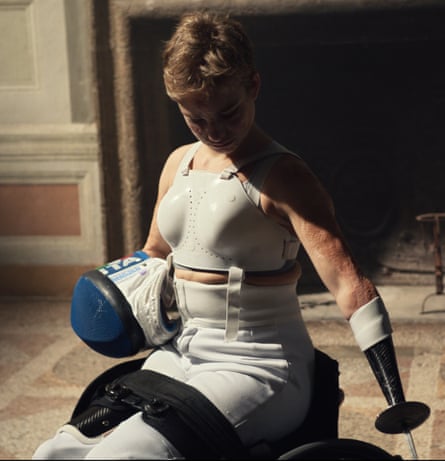
“I’m on this line of understanding disability and understanding the ignorance of some people with ablism,” she says. “I understand how a person can think one way. But this documentary is opening the box; the film and the song is putting it dead in your face. You’re going to see how amazing people with disabilities are.”
Discrimination against the disabled takes many forms, including hiding behind a patronising cloak of apparent concern. Ultimately it derives from fear, Doman believes. “What we have is so special – it shines so, so bright – that I think they’re scared of the light,” he says. “I think that’s why it’s so hard for us. I think they’re scared of our potential. I think they fear it.”
Responses to the work of Krip-Hop Nation in organising concerts, mixtapes and advocacy have been mixed, even within a world as steeped in social-justice protest as rap. “When we first started we got a lot of hate emails from hip-hop journalists,” Moore says. “For our first event, we got disabled and queer hip-hop artists together, and we got a lot of flak for that. I was there in New York in the late-70s, and saw women hip-hop artists, people on crutches. But when hip-hop went from the streets to the suites, we got the negative pushback.”
It may only be one song, at the end of one film, but all those involved believe that Rising Phoenix has the potential to catalyse real change. Certainly, the opportunity to confront preconceptions is one that the format of a bullish rap track is well suited to provide.
“Music is the bridge,” says Jones. “You can always bridge a difficult conversation with a song. ‘Able-bodied’, or ‘non-disabled’, people find it conceptually hard to see a person with a different human condition but who has the same kind of drive that a ‘non-disabled’ person has. That, for me, is what I hope we can shatter. As much as [the film] is centred around sport, it’s really centred around life. It’s: ‘Yes, thank you for loving me as an athlete – but would you date me?’ It’s: ‘Thank you for loving my song, but would you marry me?’ If my disability weirds you out, then I don’t know if you’re aware enough of your own humanity to even appreciate mine.”
The entertainment industry has a particular power in reshaping preconceptions, the artists argue. As important as a more diverse workforce in record, TV and film companies would be in helping establish better understanding and representation, having disabled people in front of the microphone and the camera is vital.
“Drake played a handicapped high-school kid on the show Degrassi: The Next Generation,” Doman says, pointing out that the casting of an actor with a disability to play a disabled character on TV – such as RJ Mitte in Breaking Bad – remains the exception rather than the rule. “Thank God Daniel was around to realise that this needs to be authentic.”
“My hope,” says Jones, “is that this doesn’t get played in the media as, ‘Oh, the negroes and the disabled people have overcome, and isn’t this a touching emotional song?’ This song is talking about strength, and what resilience you need in order to wake up, still wanna be an athlete, still wanna rap, still wanna be a human, knowing that society collectively has deemed your human condition less than adequate. That kind of power is what’s underneath the song, and that’s what comes through when I listen to it.”
“There are so many artists that have disabilities, and that’s important because most of us don’t have regular jobs,” says Hickman. “We have to get creative. I live off what I write and create because I can’t do certain jobs. And that goes for a lot of people with disabilities. So I would ask people to support their disabled community, but support their talents as well – because this is literally what they have to give.”
“These are real superheroes – real people: that’s what I want people to get,” says Doman. “You might think of disability as weakness, but it’s not. Because we’re still here, and we’re still rising.”
